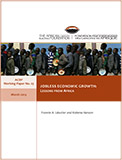
Following the 2008-2009 global financial crisis, economic growth has eluded many countries. Africa, on the other hand, is projected to host seven of the ten fastest growing economies in the period from 2011-2012. It has long been understood that high economic growth is a prerequisite for job creation, causing analysts to worry about the projected low global growth scenario and its implications for economies that have either high or stubborn levels of unemployment. However, long run comparisons across Africa have shown differential performance, with some countries having better outcomes in terms of job creating economic growth. Furthermore, many African countries were long trapped in low growth scenarios yet managed to create jobs. Such patterns have led many critics to question why high economic growth rates have not led to job creation in some countries while they have in others. Critics also question whether the high economic growth rates projected for Africa will lead to job creation in the coming years. In this paper we investigate the performance of African economies with respect to job creation and its relation to economic growth. We submit that the main drivers, among others, appear to be the creative use of the agricultural sector, the success in growing market size, and the level of innovation in the country. The insights provide some lessons for countries seeking to speed up job creation under low growth scenarios as well as those seeking to ensure that high economic growth scenarios maximize the potential for job creation.





